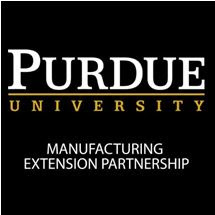
(WEST LAFAYETTE) – The Purdue Manufacturing Extension Partnership (MEP) Center has been awarded nearly $18 million in federal funding over the next five years to expand its service to Indiana manufacturers. With anticipated local industry funding, the total budget will exceed $30 million during the five-year span.
The funding allows the center to provide critical manufacturing services across the state, COVID-19-related assistance and advanced manufacturing technology implementation.
The center’s extensive engagement with the state’s manufacturers and the resulting economic impacts were key in obtaining the funding. The National Institute of Standards and Technology (NIST) Hollings Manufacturing Extension Partnership is the source of the following three separate awards: base operating funding through June 2025, Cares Act National Emergency Assistance Program (NEAP), and advanced manufacturing technology.
“Purdue MEP is a tremendous resource for Indiana manufacturers and will prove to be even more vital in the future by helping companies navigate the uncertainties of the current environment,” said Kevin Hayes, past chair, MEP Board of Advisors and executive vice president of operations, BraunAbility Corp.
The Purdue MEP Center has a history of high marks within the national program’s performance metrics. In the past year, the organization has provided assistance to more than 1,200 companies in areas such as Lean manufacturing, quality improvement, leadership development and cybersecurity. More significantly, the center has helped its clients collectively achieve more than $4.35 billion in economic impact in Indiana.
“Purdue MEP has consistently demonstrated a commitment to strengthening U.S. manufacturing and serving as an exemplary member of the MEP National Network. We look forward seeing the positive results for Indiana smaller manufacturers made possible by these new awards,” said Carroll A. Thomas, MEP director.
The Base Award will allow the Center to continue its efforts to enhance the productivity and technological performance of Indiana manufacturers, specifically in the areas of Lean manufacturing, leadership development, cybersecurity, Six Sigma certification, collaborative robotics, sustainability and quality management systems.
“The tireless efforts of the Purdue MEP team have been outstanding. This is a great day for Purdue and Indiana’s manufacturing sector,” said Theresa Mayer, Purdue’s executive vice president for research and partnerships.
The NEAP funding will be solely for projects to assist manufacturers in preparing for and responding to the COVID-19 pandemic. Specifically, this allows Purdue MEP to help manufacturers recover from workforce and supply-chain interruptions, assess the operating needs of manufacturers, scout for manufacturers that can produce critically needed medical equipment and supplies, and organize peer-to-peer manufacturing councils.
The Advanced Manufacturing Technology initiative will position Purdue MEP to provide small manufacturers assistance with robotic technologies to increase the adoption of robotics, flexible automation and related Industry 4.0 technologies that will help address the critical shortage of skilled manufacturing labor. This project will be in collaboration with MEP centers in Iowa, Ohio, Illinois and Pennsylvania.
“We are thrilled to build upon our work with Indiana manufacturers and appreciate that NIST MEP has accepted these three unique proposals,” said David Snow, Purdue MEP’s director. “These awards will allow us to expand our core competencies and assist manufactures with the unique challenges posed by the current environment.”
About the Purdue Manufacturing Extension Partnership
Purdue MEP provides high-value solutions to help Indiana businesses maximize their success. As advocates for Indiana’s thousands of manufacturers, its staff identifies areas of improvement, streamlines processes and, ultimately, increases competitiveness. Purdue MEP serves over 500 companies annually by implementing continuous improvement principles in the areas of productivity, growth, and technology.
Source: David Snow, 317-275-6811, davesnow@purdue.edu



